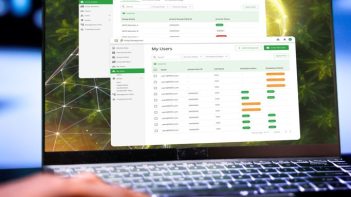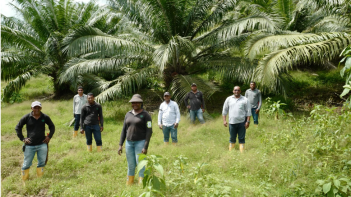In the ever expanding universe of sustainability, the stars have been aligned for Camilo Santos Arevalo, RSPO’s new Deputy Director for Market Transformation, Latin America. Describing himself as “a man with boots” owing to his farming background, Colombian-born Camilo shares that sustainability is imprinted in his DNA – his sustainability journey started when he was granted a scholarship to study Agronomy at EARTH (Escuela de Agricultura de la Region Tropical Humeda) University in Costa Rica, which is funded by the US National Cooperation Agency to disseminate knowledge on rainforests around Latin America. Around the same time, the pivotal Rio Earth Summit was held in Brazil in 1992, which laid the groundwork for global action on climate change and sustainable development, principally through the adoption of the Rio Declaration.
Camilo returned to Colombia during a challenging time of social upheaval in the country, which had been embroiled in over 50 years of armed conflict. He started working for Colombia’s national protection agency, at a nascent stage of Colombia´s environmental law. He was tasked with reviewing national infrastructure programmes, helping develop several of the country’s sustainability standards. His foray into the oil palm sector began with FEDEPALMA, Colombia’s national association of palm growers, to promote sustainability in the oil palm sector.
It was during the pandemic when he got a call from Colombia’s Ministry of Agriculture, which gave him the opportunity to travel to the country’s remotest regions with the national Air Force to implement food distribution programmes.
With infectious passion and optimism, Camilo joins RSPO at a dynamic moment for Latin America, a region praised as a sustainability leader for its innovation and rapid growth in sustainable palm oil production. Taking time between plantation visits, Camilo imparts his wisdom from having worked close to the soil for most of his life, in taking on the biggest challenges that come with success in the region.
How has your previous professional experience and Agronomy background helped ease you into your new role in RSPO?
I was a storyteller of Colombia’s oil palm history in the region. Working for FEDEPALMA was a good opportunity to get a mix from my agricultural training and environmental law. My involvement in public policy around the palm oil industry was also very important.
As I’ve told my staff, I’m a man with boots. I’m a granjero (farmer) after all, I wake up early every day like every person in agriculture, who knows that you have to take advantage of the early hours.
It was important for me to understand the entire palm oil process. This is part of my storytelling: oil palm times are long. You cannot expect change on a monthly or yearly basis. A cycle in oil palm could take 30 to 35 years – that’s one cycle of a palm oil plantation, or just one year for an oil palm. RSPO is 20 years old, not even a year old in oil palm terms. We have to think about what will do in the next 20 – or one year in an oil palm life cycle.
What have been your initial impressions and insights of RSPO since assuming your new role?
Getting onboard with RSPO involved a very transparent process, which created independence for me when I assumed the role. I had gained all the experience from before and put it in the selection process. It’s really an honour for me – it’s not about putting my experience, but putting my passion at the service of RSPO and its members.
Getting to understand the RSPO Standards in detail has been really interesting for me. It’s what I call “from field to fork”. I’d also like to amplify my networking, getting knowledge and sharing this knowledge with colleagues from India and Africa, learning about the specific views of the oil palm industry in those regions.
Latin America has been applauded for its sustainability leadership, having the highest level of certification among palm oil producing regions. What in your view are the main factors driving this leadership, and what countries are leading the charge?
Colombia is a reference point in Latin America. In contributing to the oil palm space, it has carried out a lot of research with the CENIPALMA Institute, central to all agricultural matters in oil palm in the region.
Latin America speaks the same language, and is in the same latitude, so we have the same timing with production. We have to align at some point, because if you add all the production of the 11 countries in Latin America, we as a region become the third largest producer in the world.
In terms of measurement, we now have real-time images with satellites all over the world monitoring what’s happening, not only in the palm oil industry, but also the world.
Latin America now has the opportunity to show how things are done differently, to continue improving to maintain what we have already gained in the region in terms of certification, good practices, and knowledge sharing. We have an understanding about the social interaction in the territory, and how the palm oil industry transcends beyond the fence to create what I like to call the “social dividend” – the social benefits created in the surroundings of the plantations.
Apart from Colombia, Brazil is a reference for sustainability. We have to work really closely on public policy in Brazil as they need to develop it a bit more, and to understand their land policies better in order to comply with our Standards. Ecuador has also made a huge step, it has been working over 10 years on the Jurisdictional Approach, exerting great effort to certify the whole country through multi-stakeholder interaction.
On a broad scope, what would you say are the biggest sustainability challenges being faced by Latin America that are unique to the region?
As my grandma used to say, “success is the hardest to maintain.” One of my goals and challenges is to maintain all the certification processes. It’s not just about gaining certification, it’s about maintaining it over time, which is important because it improves the system’s credibility.
I also need to work with my team to convince more stakeholders to become RSPO Members, and to improve the involvement of all existing members. One good example is the first group of independent smallholders getting their Milestone B certification here in Colombia. This provides a “mirror effect”, because if they can do it, then it’s doable all over the region. Now we have groups from Peru also seeking it.
Speaking of smallholders, strengthening their inclusion in the palm oil value chain has become more urgent than ever. What solutions would you like to implement to address the biggest challenges of Latin American smallholders?
We already have the major and the mid-sized producers already certified. But there is still a big portion represented by smallholders, who we need to help move towards those first steps of certification. They have to understand and believe what RSPO could provide through our Standards. We have to tell them that we understand that they cannot accomplish certification in the same way a big producer does. From there, we give them a toolbox that is doable for them.
Second, RSPO has created a fund, and one of my tasks here is working with national governments in order to provide and assume some financial aid in order to put the smallholders on that next step of being certified.
Looking ahead, what are your main priorities for the coming years?
My first priority is to keep supporting the Secretariat on all matters related to Latin America. We are an international organisation with a lot of projects, training and interactions, so my first goal is to keep helping and improving the Secretariat. It’s important for me to keep engaging with Members and stakeholders to move and increase awareness in the adoption and uptake of RSPO Certification.
We need to keep communicating that RSPO is a voluntary system. We have a lot of stakeholders that complain about what the palm oil sector is doing in Latin America. Criticism is more than welcome, and it’s better that we have more people talking about RSPO than not being talked about. I say, give us time, we’ve only had 20 years. In Colombia, the first certification happened in 2014, when Latin American producers started believing and working with RSPO. In nine years, look what we have accomplished!
I always say “what is good for agro, is good for the world population”. I say this when I wake up in the morning or go to my job. We have to gain the confidence of people who have the same objective. Sustainability matters and now that I have this opportunity, I’m going to take full advantage of it to become the sustainability ambassador in Latin America.
Keep reading

Access into prisma

Updated Trace Function in prisma

Call for Expression of Interest: Independent Investigation of a Complaint

Latin American Smallholders, Key Global Brands Gather in Peruvian Amazon to Advance Sustainable Palm Oil

RSPO Forum for Members and Certification Bodies 2025: Strengthening Capacities and Building Bridges with RSPO Members

From Violence to Prosperity: Cultivating Sustainable Palm Oil in San Pablo, Colombia

Palmas de Tumaco: Enduring, Trusting, and Transforming in Colombia’s Pacific Coast
Carry Over Credits for Certified Independent Smallholder Groups




